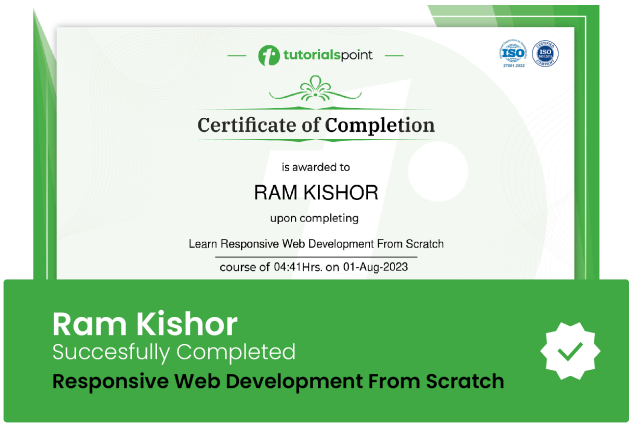Mastery in investment appraisal techniques
PB period, ARR, NPV, IRR, annuity & perpetuity, non-annual receipts, PI & non-financial factors in capital budgeting

Lectures -53
Resources -46
Duration -4 hours

30-days Money-Back Guarantee
Get your team access to 10000+ top Tutorials Point courses anytime, anywhere.
Course Description
You will learn everything you need to know in investment appraisal fundamentals. As an investor, your perspectives on investment alternatives will radically change after completing this course. You will be able to choose the best projects for your precious funds. As a student, you will get to know all the basic investment appraisal techniques which could appear in your exams. I can assure you that this course will give you the maximum return for your investment on this programme by making you the master in investment appraisal techniques.
At the completion of this course, you will be a master in following investment appraisal techniques.
Traditional Payback Period
Accounting Rate of Return / Average Rate of Return (ARR)
Net Present Value (NPV)
Internal Rate of Return (IRR)
Discounted Payback Period
In addition to these techniques, you will learn how to incorporate the following aspects in investment appraisals.
Annuity and Perpetuity
Non-annual cashflows
Capital rationing and Profitability Index (PI)
Non-financial factors
Designed to make you an expert
You will get concept explanation animation videos, theory explanation handouts, question sets, answer keys and answer explanation videos for each topic. There are more than 70 practice questions with answer explanation. All the theory explanation handouts, question sets and answer keys have been given in a downloadable format to make sure you get maximum out of it.
If you want to be a master in investment appraisal techniques, you should follow the following steps.
Step 01: Watch the concept explanation video
Step 02: Read the theory explanation handout
Step 03: Try the relevant question set
Step 04: If you feel comfortable with the questions, check your answers with the recommended answers. If not, go back and watch the video again.
Step 05: Watch the answer explanation video to consolidate your knowledge (answer explanation videos have been given for the selected challenging questions only)
Bonus step: Watch the videos explaining the application of Excel formulae to calculate NPV and IRR.
What you will get in each section
Section 01: Introduction to the course
The structure of the course is explained with few ground rules to follow.
Section 02: Introduction to investment appraisal
Importance of investment appraisal
Classification of investment appraisal techniques
Section 03: Payback period
Importance of the traditional payback period
How to calculate the payback period
How to calculate the payback period when you have many investments in different years
Pros and cons of payback period method
Section 04: Average Rate of Return / Accounting Rate of Return (ARR)
Key equations to calculate the ARR
How to calculate ARRPros and cons of the ARR technique
Section 05: Time value of money
Why money has a time value
The logic behind calculating the present value from the future value
The meaning of cost of capital / discount rate
How to tackle the deferred and advanced cashflows
Section 06: Net Present Value (NPV)
How to calculate NPV using the formula
How to calculate NPV using the present value table
Pros and cons of NPV method
Section 07: Annuity and Perpetuity
The concept of annuity
How to use annuity techniques in NPV calculation
Annuity techniques for the advanced and deferred cashflows
Annuity techniques for the constant cashflows in the middle of a project
How to use perpetuity in NPV calculation
Perpetuity techniques for advanced and deferred cashflows
Section 08: NPV with non-annual cashflows
How to convert the annual cost of capital to a non-annual period
How to incorporate monthly, quarterly and bi-annum cashflows in NPV calculations
How to apply annuity techniques for non-annual cashflows
Section 09: A comprehensive NPV calculation
An NPV calculation with non-annual cashflows, annuity techniques and irrelevant cost
Section 10: Internal Rate of Return (IRR)
Simplified explanation on the concept of IRR
How to calculate IRR
Pros and cons of the IRR technique
Section 11: Discounted Payback Period
How to calculate discounted payback period
Section 12: Capital Rationing and Profitability Index (PI)
The concept of capital rationing and the underlying assumptions
Calculating the PI and ranking the projects according to the PI
How to allocated the limited funds among different projects
Section 13: Calculating NPV and IRR using the Excel formulae
How to calculate NPV using the inbuilt Excel formula
How to calculate IRR using the inbuilt Excel formula
Section 14: Non-financial factors in investment appraisal
The non-financial factors which could affect our investment decisions
The importance of considering the non-financial factors when making investment decisions
Who this course is for:
- Students who follow professional courses such as CIMA, ACCA or AAT.
- Undergraduates or postgraduates who need to learn investment appraisal techniques.
- Professionals from non-financial backgrounds
- Novice investors
Goals
What will you learn in this course:
Students will learn widely used and accepted investment appraisal techniques and how and when to use them.
Students will learn to apply payback period, ARR, NPV, IRR and discounted payback methods and the strengths and weaknesses of those methods.
Students will learn annuity and perpetuity techniques, non-annual cashflow adjustments, capital rationing and profitability index (PI) and importance of non-financial factors in investment appraisals.
Students will learn how to do investment
Prerequisites
What are the prerequisites for this course?
No prior knowledge required. All the concepts will be explained from the elementary level.

Curriculum
Check out the detailed breakdown of what’s inside the course
Introduction to the course
1 Lectures
-
Course introduction video 03:06 03:06
Introduction to investment appraisal techniques
3 Lectures

Payback Period Method
6 Lectures

Average Rate of Return (ARR)
5 Lectures

Time Value of Money
3 Lectures

Net Present Value (NPV)
7 Lectures

Annuity and Perpetuity
6 Lectures

NPV with non-annual cashflows
4 Lectures

A comprehensive NPV calculation with annuity and non-annual cashflows
2 Lectures

Internal Rate of Return (IRR)
4 Lectures

Discounted Payback Period Method
4 Lectures

Capital Rationing and Profitability Index (PI)
3 Lectures

Calculating NPV and IRR using Excel formulae
3 Lectures

Non-financial factors in investment appraisal
2 Lectures

Instructor Details

Selvaratnam Ajendra
eCourse Certificate
Use your certificate to make a career change or to advance in your current career.

Our students work
with the Best


































Related Video Courses
View MoreAnnual Membership
Become a valued member of Tutorials Point and enjoy unlimited access to our vast library of top-rated Video Courses
Subscribe now
Online Certifications
Master prominent technologies at full length and become a valued certified professional.
Explore Now


 Updated on Apr, 2024
Updated on Apr, 2024
 Language - English
Language - English